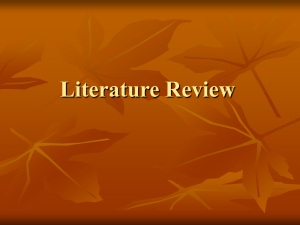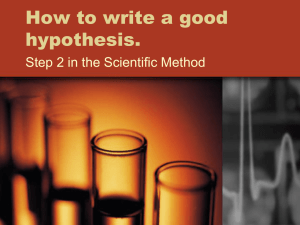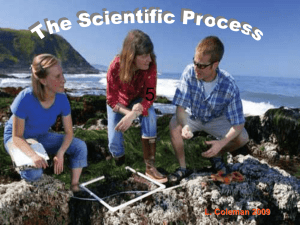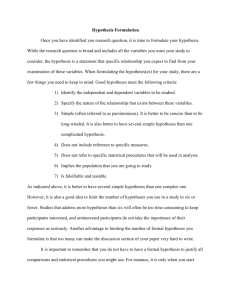Step 3: Generate a Research Hypothesis
advertisement
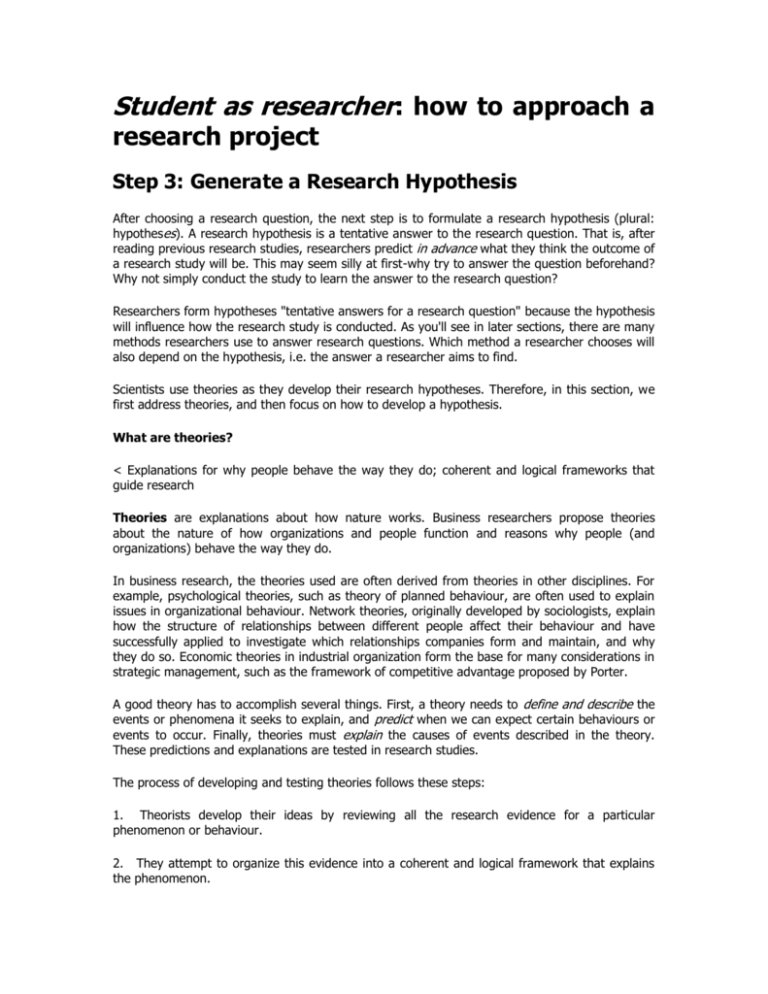
Student as researcher: how to approach a research project Step 3: Generate a Research Hypothesis After choosing a research question, the next step is to formulate a research hypothesis (plural: hypotheses). A research hypothesis is a tentative answer to the research question. That is, after reading previous research studies, researchers predict in advance what they think the outcome of a research study will be. This may seem silly at first-why try to answer the question beforehand? Why not simply conduct the study to learn the answer to the research question? Researchers form hypotheses "tentative answers for a research question" because the hypothesis will influence how the research study is conducted. As you'll see in later sections, there are many methods researchers use to answer research questions. Which method a researcher chooses will also depend on the hypothesis, i.e. the answer a researcher aims to find. Scientists use theories as they develop their research hypotheses. Therefore, in this section, we first address theories, and then focus on how to develop a hypothesis. What are theories? < Explanations for why people behave the way they do; coherent and logical frameworks that guide research Theories are explanations about how nature works. Business researchers propose theories about the nature of how organizations and people function and reasons why people (and organizations) behave the way they do. In business research, the theories used are often derived from theories in other disciplines. For example, psychological theories, such as theory of planned behaviour, are often used to explain issues in organizational behaviour. Network theories, originally developed by sociologists, explain how the structure of relationships between different people affect their behaviour and have successfully applied to investigate which relationships companies form and maintain, and why they do so. Economic theories in industrial organization form the base for many considerations in strategic management, such as the framework of competitive advantage proposed by Porter. A good theory has to accomplish several things. First, a theory needs to define and describe the events or phenomena it seeks to explain, and predict when we can expect certain behaviours or events to occur. Finally, theories must explain the causes of events described in the theory. These predictions and explanations are tested in research studies. The process of developing and testing theories follows these steps: 1. Theorists develop their ideas by reviewing all the research evidence for a particular phenomenon or behaviour. 2. They attempt to organize this evidence into a coherent and logical framework that explains the phenomenon. 3. Using this theory, new ideas and hypotheses are developed to guide the next research projects in an area. 4. These new research studies help to refine the theory. 5. The end result is a greater understanding of human behaviour and mental processes. What is a research hypothesis? < Simpler, more tentative explanation that can be tested A research hypothesis is simpler and more tentative than a theory. That is, any particular hypothesis may represent only a small part of the theory. Several criteria determine whether a hypothesis is testable (i.e., can be investigated in a research study). First, the concepts addressed by the hypothesis must be clearly defined and measurable. Hypotheses cannot be tested if they are circular. A circular hypothesis occurs when an event itself becomes an explanation for the event. We can find circular hypotheses on many talk shows and in our everyday conversations. For example, to say "The company Biosyns files for many patents … because it is innovative" is circular. Because being innovative can be defined by the number of patents filed, this hypothesis doesn't explain anything. It offers no more than saying, "Biosyns is innovative because it is innovative." A good hypothesis avoids this type of circularity. Finally, research hypotheses must refer to concepts that can be studied scientifically. To say that a company’s aggressive strategies are caused by the devil isn't a testable hypothesis because this hypothesis refers to a concept (the devil) that isn't in the province of science. Science deals with what can be observed; this is the basis for empirical observation. How can I come up with a research hypothesis? < Read research studies, consider personal experiences, think of exceptions and inconsistencies There are many ways to generate a research hypothesis. After reading research studies related to your research question, you may consider whether your personal experiences match what is described by the theories and past research. You may also "brainstorm" to think of "exceptions to the rule." That is, a theory or past research may describe only specific situations; you may think of conditions in which the theory may not apply. As you continue to read research articles, you will find inconsistencies or disagreements among researchers. In all of these situations, you may think of explanations for the discrepancies among previous research articles, and why the theories and research may differ from your own experience. These explanations become fruitful research hypotheses. Our next step in the research process is to look at the theories that influenced the thinking of the role of social networks in the decision to start a business and the hypothesis they generated. Also, we will ask you to think of a hypothesis for this research. Which theories guided the research. A central theoretical consideration comes from the well-known paper “Economic action, social structure and embeddedness” by Mark Granovetter published 1985 in the American Journal of Sociology. The main thought of the paper is that how people are related with others will influence their behaviour and that this idea also extends to business companies, i.e. the relationship companies have with each other will influence the decisions and choices made. It should be noted that this thought challenges the neo-classical economic assumption that economic actors are anonymous. Following this paper, other scholars have further investigated the phenomena of social embeddedness and networks. Most notably, James Coleman analysed the relationship between actions and relations and structures of actions in his book “Foundations of Social Theory” published in 1990, while Ronald Burt introduced ‘structural holes’ as a new concept in network research in his book “Structural Holes” published in 1992. We built our research on this stream. The work of Coleman and Burt suggests that dense networks as well as loose networks have beneficial effects. Departing from this, we theorize that one should look not only at the overall network structure or social embeddedness, but rather should start to look at the specific relationships and what characterizes them. Thus, we argue that a network is not sufficiently captured by its structure but also needs to account for characteristics of the individual relationships. What hypothesis did we test in our research project? In one of our studies we derived the following three grand hypotheses. • Potential business starters with personal networks characterized by (a) many ties (b) more diverse ties and (c) a large share of ties to other self-employed possess more relevant social capital and are therefore more likely to start a business. • Potential business starters with personal networks characterized by (a) a high network homogeneity (b) a high share of closed ties, and (c) a high share of old ties increase the quality of resources they can access and are therefore more likely to start a business. • The larger the proportion of weak ties that are also old or close, in a network, the higher the chances are to start a business. What hypothesis would you develop? A first step in developing a hypothesis is to see how ideas match your experience. Ask yourself these questions: • Do you often use network contacts to get things done? • What can you ask from different people in your network? On what does it depend what you can ask for and whether they will provide it willingly? An important step in developing hypotheses is to know the findings from previous research. Step 3: Generate a Research Hypothesis A central component of the research process is the hypothesis. Ask yourself these questions when you read or hear about research to evaluate the researcher's hypothesis: • Does the researcher present a theory about the phenomena that are investigated? • Does the theory define and describe events, predict when specific phenomena or events should occur, and explain the causes of events described in the theory? • Is a research hypothesis presented? • Is the hypothesis testable? That is, are the concepts clearly defined and measurable; does the hypothesis avoid circularity; does the hypothesis refer to concepts that are scientific? • Is the hypothesis very general or very specific? (Specific hypotheses provide better tests of theories.)




